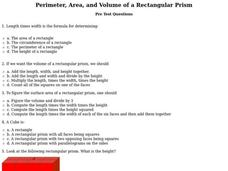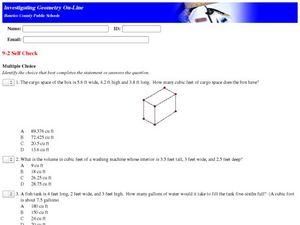Curated OER
Perimeter, Area, and Volume of a Rectangular Prism
Upper elementary and middle schoolers answer ten mutliple choice questions by applying the formulas for finding the area, perimeter, and volume of a rectangular prism.
Virginia Department of Education
Attributes of a Rectangular Prism
A change is coming. Pupils use unit cubes to investigate how changes in the length, width, and/or height affects volume and surface area. They extend the results to write and test predictions on the effect of changing multiple sides on...
Curated OER
Name the 3 Dimensional Shapes of the Objects
Here are six solid figures for learners to identify. The names are listed along the left side and the shapes pictured on the right. Each shape is shown as a familiar object instead of just a drawing. Figures include a cylinder,...
Curated OER
Volume and Surface Area of Rectangular Prisms and Cylinders
In this volume and surface area worksheet, students compute the volume and surface area of 8 shapes. Four shapes are rectangular prisms, four shapes are cylinders.
Curated OER
Perimeter, Area, and Volume of a Rectangular Prism
In this prism math lesson, students answer and solve the 10 problem sentences for perimeter, area, and volume of a rectangular prism. Students select their answers from multiple choice options.
Curated OER
Surface Area and Volume
In this surface area and volume instructional activity, 8th graders solve 11 various geometry problems that include determining the surface area and volume for the measurements given and finding the surface area for each solid shown....
Curated OER
Calculating Volume
In this math worksheet, students complete 21 problems where they must find the volume of cubes and rectangular prisms. Since the formula for finding volume is such an important formula within geometry, this worksheet provides excellent...
Curated OER
Surface Area of a Cube
Your geometers apply the formula for surface area of a cube in 8 straightforward problems given the measure of a side. Space to work is part of the graphic design. I'd assign it for homework. Give them time to get started in class so you...
Curated OER
Geometric Shapes: Which Item?
Which item is shaped like a cone? Give students a chance to compare shapes, determining which item represents the prompted shape or figure (and which don't). Through 4 multiple-choice questions, scholars identify a cone, a cube, a...
Learner
Solid Shapes
A collection of two lessons, kindergartners will identify two-dimensional shapes in solid shapes. They will develop basic knowledge of the components that make up a sphere, rectangular prism, pyramid, cylinder, cone, and cube. Young...
Curated OER
Two for One Box Company: Student Worksheet
Fifth and sixth graders work alone or in pairs to determine the volume of paper boxes of various dimensions. Pupils write ratios of dimensions and volumes.
Curated OER
Unit 22: Volume
In this volume instructional activity, students determine the volume of rectangular prisms. Students examine diagrams, tables and short story problems to determine information needed to find the volume. This ten-page instructional...
Curated OER
Volumes
In this volume instructional activity, 6th graders solve 5 different problems related to determining the volume of various objects. They determine the volume of a rectangular prism, a cone, a cube, a pyramid, and a cylinder.
Illustrative Mathematics
Computing Volume Progression 1
Finding the volume of a right rectangular prism is the focus of the resource. Worksheet includes a drawing of a cube to help learners visualize the concept. Young geometers will learn that as the side length increases, so does the...
Curated OER
Surface Area Formulas
In this geometry worksheet, students complete 21 problems where they find the surface area of pyramids, cubes, and rectangular prisms. This excellent worksheet would be an ideal quiz, or homework assignment.
Curated OER
Recognizing 3-D Shapes, Part 2
Take your math lesson to another dimension with this lesson about 3-D shapes! First graders label cones, cylinders, pyramids, spheres, cubes, and prisms, and then count the number of each shape in a collective picture. A great way to...
Illustrative Mathematics
Christo’s Building
Hook your charges on how to solve a real-world art problem with mathematics by showing works of Christo. You can find eye-catching images on the Christo and Jeanne Claude webpage. Here, math learners help Jean Claude and Christo prepare...
Curated OER
Volume of a Cube without a Picture
In this geometry worksheet, students draw and calculate the volume of a cube from the given side length measured in metric or customary. There are 8 questions with provided workspace.
Curated OER
Volume
In this volume worksheet, students determine the number of cuboids needed to create a rectangular prism of a particular size. They determine the mass, volume and density of cereal boxes. Students determine the volume of rectangular...
Noyce Foundation
Building Blocks
Building blocks have more uses than simply entertaining children. Young mathematicians calculate the volume of a given cube, and then calculate the volume and surface area of a prism formed from multiple cubes.
Curated OER
Volume
In this volume worksheet, 8th graders solve and complete 6 different short answer questions and problems that relate to volume. First, they determine the number of cubes found altogether that has a given length, width and height. Then,...
Curated OER
Perimeter, Area, Volume and Surface Area
In this perimeter of shapes learning exercise, 10th graders find the perimeter of the shapes illustrated. Then, they find the volume of each shape shown. Students also match the shape with its correct name on the left and find the...
Curated OER
Geometry Practice GG10: Prisms
For this prisms worksheet, students identify the number of faces in a prism. They locate the parallel edges. Students determine the names of prisms. This two-page worksheet contains 3 problems. Answers are listed on the last page.
K12 Reader
3-D: It’s Not Just for Movies
This two-part reading comprehension exercise asks kids to read a short passage about cubes, rectangular prisms, spheres and pyramids, and then to respond to a series of questions about the article.

























